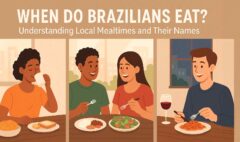Brazilian vs American Names: Key Differences You Should Know
Brazilian vs American Names: Key Differences You Should Know
Introduction
Ever met someone named João Pedro da Silva and wondered why their name is so long compared to, say, John Smith? That’s the beauty of cultural diversity in naming. In this article, we’re diving deep into the fascinating world of Brazilian and American names — their structure, meaning, and cultural weight.
Naming Structure
Typical American Naming Structure
In the U.S., names are usually structured like this:
First Name + Middle Name + Last Name
Example: Emily Marie Johnson
This format is straightforward and usually includes one surname (typically the father’s last name) and often a middle name for variety or family tribute.
Typical Brazilian Naming Structure
In Brazil, names follow a more complex pattern:
Given Name + Mother’s Surname + Father’s Surname
Example: Ana Beatriz Costa Oliveira
Yes, Brazilians usually carry two family names — one from the mother and one from the father. The father’s surname usually comes last.
Cultural and Historical Influences
American Naming Traditions
American names are heavily influenced by immigration, pop culture, and biblical roots. You’ll find names from Irish, German, Italian, and other European heritages, often simplified over generations.
Brazilian Naming Traditions
Brazilian names reflect Portuguese colonial roots, African heritage, Indigenous cultures, and Catholicism. This rich blend results in melodic names with deep meanings.
The Role of Middle Names
Americans and Middle Names
Middle names are a staple in the U.S. They’re often used to honor a relative or add uniqueness. Some people even go by their middle names!
Brazilians and Multiple Surnames
In Brazil, middle names aren’t as common as they are in the U.S. Instead, the “extra” names are usually additional surnames, which reflect both sides of the family.
Gender and Naming Patterns
Male and Female Name Conventions in the U.S.
Names like Michael and Jessica are clearly gendered. Recently, unisex names like Taylor or Jordan have become trendy.
Gender-Specific Endings in Brazil
Brazilian names often end in gendered suffixes:
-
Carlos (male), Carla (female)
-
João (male), Joana (female)
Popular Name Trends
Most Common American Names
Currently popular names in the U.S. include:
-
Boys: Liam, Noah, James
-
Girls: Olivia, Emma, Ava
Most Common Brazilian Names
Top Brazilian names often blend tradition and faith:
-
Boys: Miguel, Lucas, Gabriel
-
Girls: Maria, Ana, Beatriz
Nicknames and Diminutives
American Nicknaming Culture
In the U.S., nicknames are often shortened forms:
-
William → Will
-
Katherine → Kate
Sometimes, they’re unrelated: Margaret → Peggy (go figure!).
Brazilian Use of Diminutives and Nicknames
Brazilians love affectionate forms:
-
João becomes Joãozinho
-
Ana becomes Aninha
Adding -inho or -inha makes a name sound cute or familiar.
Legal and Official Naming Rules
U.S. Naming Laws
American parents have a lot of freedom. Laws vary by state, but generally, you can name your child almost anything — except for things like numbers or symbols.
Brazil’s Civil Code on Names
Brazilian law is stricter. Names can be rejected if they are offensive or expose the person to ridicule. Also, family surnames usually follow the standard maternal + paternal order.
Religious and Regional Influences
Bible Names in the U.S.
Names like Jacob, Sarah, and David reflect the strong Christian influence in American culture.
Catholic Influence in Brazil
Catholic saints inspire many Brazilian names:
-
Maria Aparecida
-
João Batista
It’s also common to combine religious names like Maria Clara or José Luiz.
Foreign Influence on Naming
Immigration and American Names
The U.S. is a melting pot. Names are borrowed, anglicized, or transformed. Giovanni becomes John, Schmidt becomes Smith.
Portuguese, Indigenous, and African Influence in Brazil
Brazilian names are deeply shaped by Portuguese tradition, but you’ll also find Indigenous names like Jaci and African-influenced ones like Zumbi.
Surnames and Family Heritage
American Surnames and Their Meanings
Many U.S. surnames originated from jobs (Baker, Smith), places (Hill, Ford), or characteristics (Strong, Short).
Brazilian Surnames as Lineage Markers
Brazilian surnames carry family identity. It’s common to find compound surnames like Silva Pereira or Santos Costa, connecting generations.
Name Changes and Flexibility
Changing Names in the U.S.
Americans can change their names for personal or professional reasons. It’s common during marriage or to adopt a stage name.
Name Change Rules in Brazil
In Brazil, name changes are legal but require a formal request and valid justification — like ridicule, gender identity, or errors on documents.
Famous Names Across Cultures
Celebrities with Cross-Cultural Names
Think of Camila Cabello or Pedro Pascal — Latin names, global fame. These names carry heritage and star power.
Brazilian Names Gaining Global Fame
Names like Pelé, Gisele Bündchen, and Anitta have put Brazilian naming styles on the map.
Names and Identity in a Global World
How Globalization Is Shaping Naming
We’re in the age of cross-cultural names. Parents are blending styles — Luca James, Isadora Grace — mixing cultures in one elegant combo.
Hybrid Names and Cultural Fusion
You might meet a Mateus Washington or a Sophia da Silva. These names bridge cultures, countries, and stories.
Conclusion
Names do more than identify us — they tell our story. Whether it’s a short and sweet Jake Smith or a lyrical Fernanda Maria Oliveira, names carry heritage, culture, and emotion. Brazilian and American naming traditions each offer a beautiful glimpse into their people and history. Next time you see a long name or a nickname that doesn’t make sense, take a second look — there’s probably a story worth hearing.
Learn Portuguese the Brazilian Way! 🇧🇷✨
At The Brazilian Ways, we believe language learning should be fun, immersive, and deeply connected to culture. Our unique courses help you speak Portuguese naturally while experiencing Brazil through its music, films, literature, and dance.
🎶 The Brazilian Music Club – Learn Portuguese through the rhythm and lyrics of Brazilian music. 🎬 The Movie Club – Improve your Portuguese while exploring the best of Brazilian cinema. 📖 The Short Story Club – Enhance your skills by diving into Brazilian literature. 💃 Portuguese for Zouk – Connect with the Zouk dance community while learning Portuguese.
✨ Join a vibrant community of learners and experience Brazil through language! 👉 Explore our programs and start today! 🚀
📲 Follow us on Instagram for more engaging content, language tips, and cultural insights: @thebrazilianwaysFAQs
1. What’s the main difference between Brazilian and American names?
Brazilian names usually include both parents’ surnames, while American names typically use just the father’s last name.
2. Can Brazilians have middle names like Americans?
Yes, but it’s less common. Brazilians often have multiple given names and surnames instead.
3. Why do Brazilians have two surnames?
To honor both the maternal and paternal family lines, following a traditional Portuguese naming pattern.
4. Are nicknames more common in Brazil or the U.S.?
Both cultures use nicknames, but Brazilians are especially fond of affectionate diminutives.
5. Can you legally change your name in Brazil?
Yes, but it requires a legal process and valid justification, like avoiding embarrassment or correcting a mistake.















